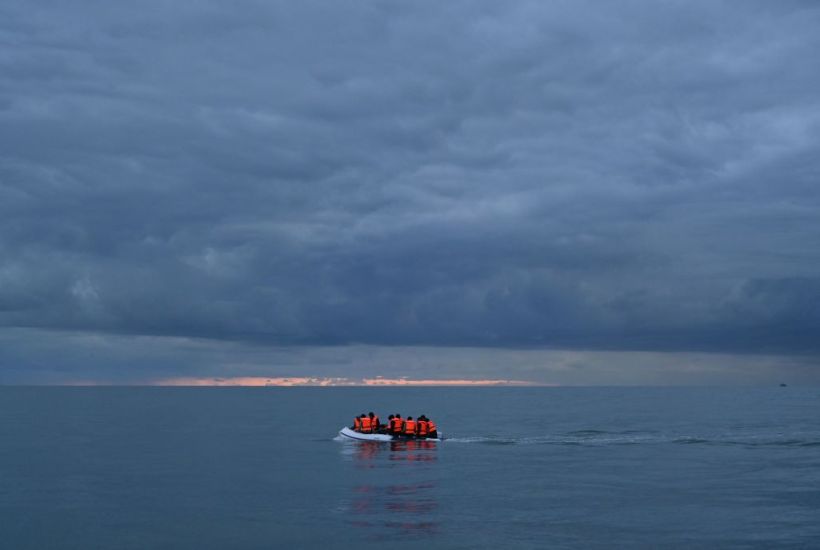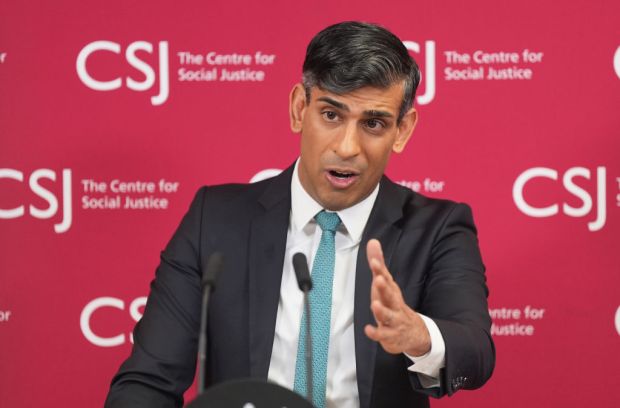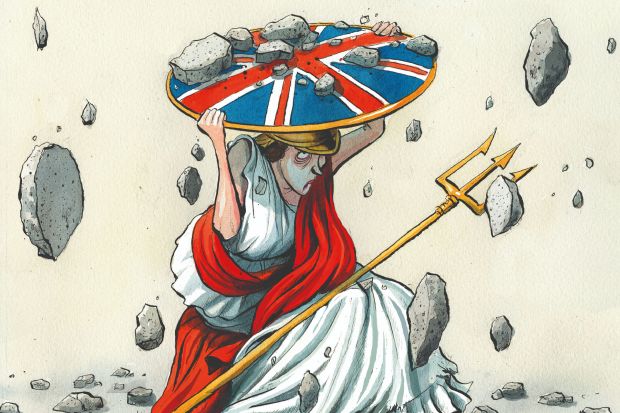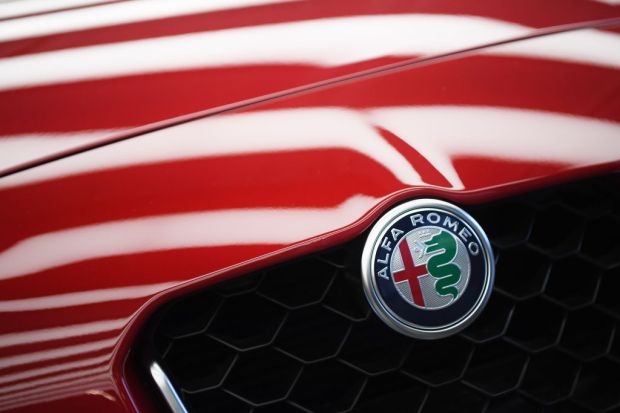Rishi Sunak’s fighting talk as he launched the latest Tory crackdown on illegal Channel migrants this week, with the dramatic words ‘Enough is enough’, ignores the question on many people’s lips: why doesn’t Britain send Channel migrants back to France? That, after all, is precisely what the French have been doing for years with migrants who cross into France from Italy at the border on the Riviera.
So, if it’s all right for France to send back migrants to Ventimiglia, why is it not all right for Britain to send back migrants to Calais?
It is claimed, above all by the French, that intercepting migrant boats in the Channel to take their passengers back to France would endanger lives. But surely not doing so in one of the world’s busiest shipping lanes endangers lives even more, as demonstrated by the deaths of four migrants whose boat capsized in the Channel in the small hours of Wednesday morning and by the rescue of 50 migrants in a second similar incident at the same time.
The Prime Minister told the House that he plans to ‘abolish’ the backlog of asylum claims by the end of next year. The backlog currently stands at just under 150,000, though the government already appears to be backtracking, insisting it would only clear 92,000. The proposal is to do that by doubling the number of case workers and thanks to a freshly sealed fast-track removal deal with Albania. Nearly a quarter of the record 45,000 Channel migrants who have arrived in Britain this year were Albanians.
Sunak also announced legislation, to be introduced early next year, that will make it ‘unambiguously clear’ that anyone who enters Britain illegally – even a real refugee – will be deported either to their homeland or a safe third country. This is an extension of former home secretary Priti Patel’s Nationality and Borders Act from April to send migrants to places such as Rwanda while their asylum claims are processed.
But so far, every attempt at a Channel migrant crackdown has come to nothing because Britain is unable to deport illegal migrants. It is thus high time that Britain started to give to the French some of the medicine they dish out to Italy – and insist that they take back migrants.
This year, according to figures published in Italy, French police have been sending back to Italy about 80 illegal migrants a day who they’ve caught crossing the frontier at and around Ventimiglia on the Riviera – either by train, car or bus, or else on foot across the mountains. That’s nearly 30,000 migrants in total this year sent back to Italy by the French.
Britain, meanwhile, has allowed in around 120 migrants a day this year who set off from Pas de Calais in small boats destined for Kent – many of whom were picked up halfway across the Channel by Border Force or RNLA vessels.
Around 45,000 migrants in total have crossed the Channel so far this year (compared with 28,526 in 2021 and 8,404 in 2020) – of whom most are men of fighting age – and about 13,000 of whom are Albanians.
Illegal and legal immigration are at record levels. Net migration in the year to June was a staggering 504,000. But it’s the Channel migrants in their small boats who provide the hi-vis proof of Tory failure to take back control.
If the Conservatives are to have any chance of winning the next election they must find a solution – and fast. But it’s not going to be last month’s Channel policing deal struck by Suella Braverman, the Home Secretary, and her French counterpart Gérald Darmanin.
Through this scheme, Britain is to increase its annual payment to France from £55 million to £63 million. It means primarily that 350 French police – rather than 250 – will patrol the 70 mile stretch of coast which houses the migrant departure zone. But, crucially, the deal doesn’t include any agreement by the French to take back migrants picked up in the Channel.
Last week, the French Coastguard deployed the first of two extra vessels earmarked for Channel policing duties off the Pas de Calais coast. To do what exactly? It’s true that occasionally, France does stop migrants in the channel and bring them back to France but only if their boats are in danger of capsizing. Last month, for instance French authorities rescued 61 migrants who were travelling in a small boat that had begun to capsize and returned them to French soil.
Normally, however, as far as the French are concerned, the phrase ‘the policing of Channel migrants’ means them stopping migrant boats before they put to sea – they claim to have stopped around half of all crossing attempts this year. But in the Channel itself, however, French policing often means, if anything, their naval or coastguard vessels escorting migrant boats into British waters. To arrest migrants at sea and take them back to France – they insist – would endanger lives. They will only intervene, they say, if asked to do so by the migrants themselves.
But why only if the migrants ask them? Why not if Britain asks? Many British observers give the Anglo equivalent of a Gallic shrug on this question: it was ever thus with the French, they say. But why? France’s justifications for not taking the migrants back to France do not stand up legally or morally.
Many wrongly blame Brexit. Since Britain left the EU (in practice at the end of 2020) it no longer participates in the Dublin III regulation that stipulates migrants must (usually) claim asylum in the first EU country they reach.
So that – it is said – explains Britain can no longer send back migrants to France. But even when Britain was still in the EU, Dublin III was of little use.
Between 2015 and 2018, for instance, Britain made 18,953 requests to transfer asylum seekers under Dublin III to other member states, but only 1,395 people were transferred – about 7 per cent.
Regardless, migrants should not be seeking asylum in Britain anyway as those claiming to be refugees are expected, though not obliged, to make asylum claims in the first safe country they reach. An asylum claim is only admissible – according to Article 31 of the 1951 Geneva Refugee Convention which forms the basis of international law – if made by someone ‘coming directly’ from an unsafe country to a safe country, and made ‘without delay’. Many of those who travel to Britain are not refugees but economic migrants who have paid around £3,500 to smuggler gangs just to cross the Channel. But even if they are genuine refugees, they have already passed through at least two safe countries before reaching the UK.
Patel, when she was home secretary, spelled it out in a written answer to parliament in June 2020: ‘It is an established principle that those in need of protection should seek asylum in the first safe country that they enter and not put their lives at risk by making unnecessary and dangerous onwards journeys to the UK. Illegal migration from safe countries undermines our efforts to help those most in need.’
Her Nationality and Borders Act that became law in April – which enables Britain to process asylum seekers in Rwanda if the courts ever agree – declares asylum claims by migrants arriving from safe countries inadmissible. And it states: ‘A person will not be considered to have come “directly” to the UK if they stopped in another country on the way unless they can show that they could not reasonably be expected to have sought asylum there.’
The Prime Minister’s planned legislation for next year would appear merely to repeat this rule. The Conservatives keep saying the same thing. And still the boats keep coming.
So why don’t we arrest the migrants at sea, and ferry them back to France? Because – say most loudly the French – it would put migrant lives at risk. But that’s not necessarily true. And doesn’t allowing the migrant boats to proceed endanger lives even more? The truth is that the French are only too happy to see the back of these migrants and Britain is not prepared to force the issue with France either de jure in the courts, or de facto at sea. In a word, when it comes to migrants, the British are not French enough.
Yet every day down at the Italian border, French police continue to round up migrants and frogmarch them back to Italy by force, if necessary. Dublin III does not give French police the right to round up and send back migrants to Italy – according to human rights lawyers – unless the migrants are first given the opportunity to challenge the decision in court, which rarely happens, and collective expulsions are illegal under the European Convention of Human Rights. Needless to say, none of this stops the French.
Last month, in a fit of pique, Darmanin despatched an extra 500 police officers to police the border with Italy – many more than the extra 100 he has ordered at Pas de Calais. He did so after Giorgia Meloni, Italy’s new right-wing leader, refused to allow a French-registered charity rescue vessel, the Ocean Viking, to dock in Sicily with 234 migrants on board because it was French.
In the end, Darmanin let the vessel dock in Toulon as an ‘exceptional’ goodwill gesture but said Meloni’s behaviour was ‘unacceptable’. He then refused to let 123 of the 234 migrants on board apply for asylum in France because he said their refugee status was not credible. He is determined – he said – to deport them to their countries of origin. Far from finished, he then suspended French adherence to an agreement with 17 other EU countries in June to take in a share of 8,000 of Italy’s migrants. The overwhelming majority of migrant sea arrivals to Europe are in Italy (98,170 migrants arrived in Italy by sea this year). France had agreed to take 3,500. How many had it taken in already? Just 38.
In Britain, according to an opinion poll for a report on Channel migrants, published last week by the Tory thinktank Centre for Policy Studies and jointly written by Nick Timothy, former Downing Street chief of staff, 68 per cent of voters say Britain should be able to deport migrants who break the law – irrespective of human rights laws (just 18 per cent disagree).
On this important issue, isn’t it about time that Britain started treating France in the same way that France treats Italy?
The post When it comes to migrants, Britain needs to be more French appeared first on The Spectator.
Got something to add? Join the discussion and comment below.
Get 10 issues for just $10
Subscribe to The Spectator Australia today for the next 10 magazine issues, plus full online access, for just $10.




















Comments
Don't miss out
Join the conversation with other Spectator Australia readers. Subscribe to leave a comment.
SUBSCRIBEAlready a subscriber? Log in